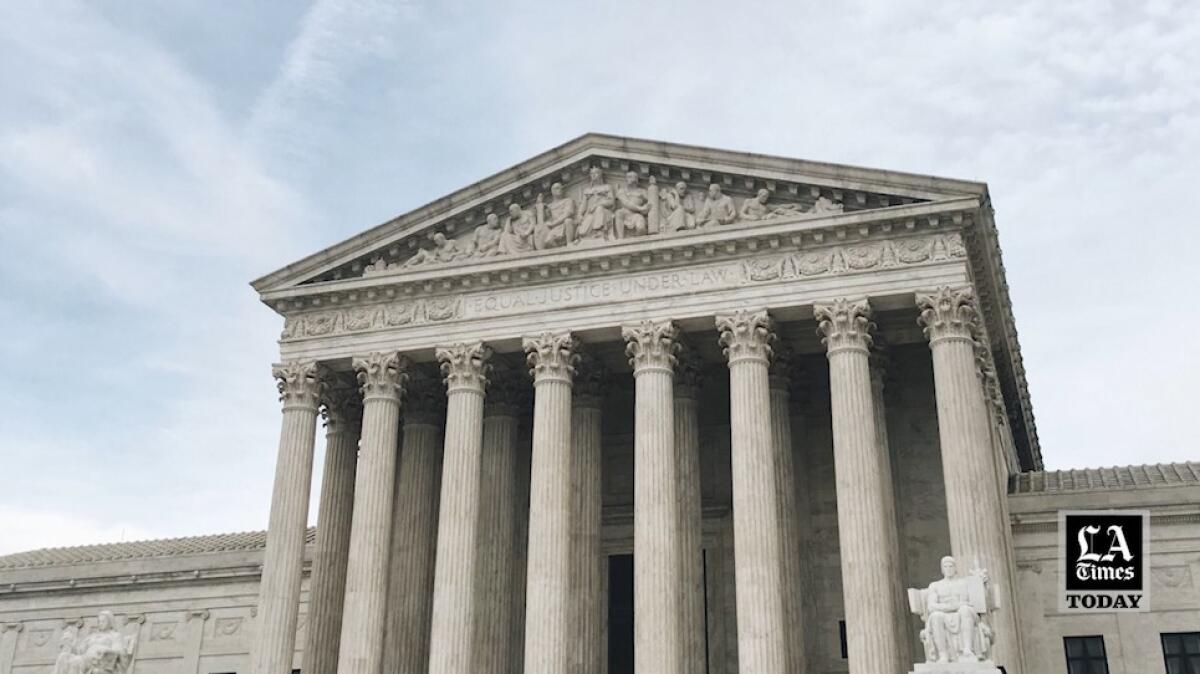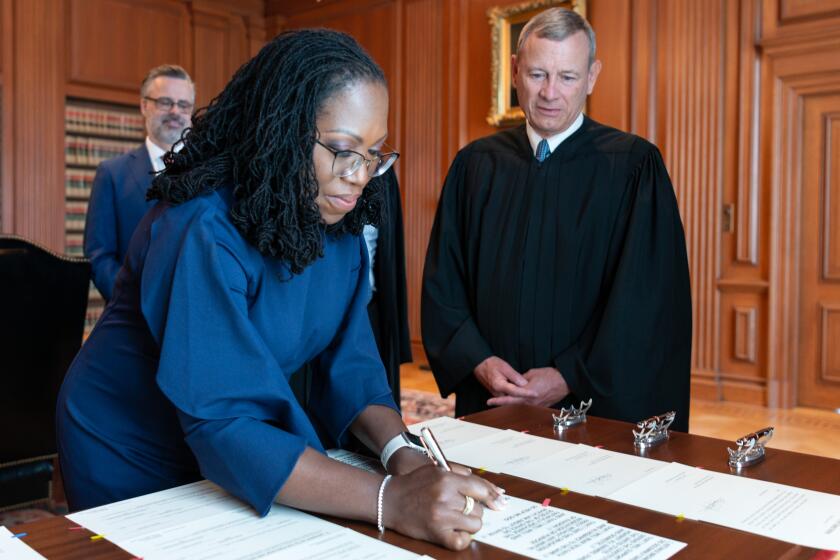Here are the major cases before the Supreme Court this fall

- Share via
WASHINGTON — Here’s a look at some of the major cases to be heard by the Supreme Court in the term beginning Oct. 3.
Race and college admissions
Are Harvard and the University of North Carolina violating the Constitution and federal civil rights law by giving an edge to qualified Black and Latino applicants and by discriminating against Asian American students?
Since the 1978 case Regents of the University of California vs. Bakke, the court has held that colleges and universities may consider race as a “plus factor” for Black and Latino applicants to create a more diverse class.
But the court’s conservatives have long opposed this affirmative action, contending that the law prohibits consideration of an applicant’s race.
Students for Fair Admission vs. Harvard and SFFA vs. UNC will be argued Oct. 31.
Race and voting rights
Does the Voting Rights Act call for fair and equal representation for Blacks and Latinos, sometimes requiring states to draw election districts likely to elect a Black or Latino candidate?
Lawyers for Alabama call this a form of “racial segregation” and urge the court to adopt a “race-neutral” rule that frees states from this duty of fair representation for racial minorities.
About 27% of Alabama residents are Black, but only one of seven congressional districts had a Black majority under the state’s map.
Merrill vs. Milligan will be argued Oct. 4.
Supreme Court opens a historic term with challenges to past liberal rulings on race, affirmative action, voting rights -- and its first Black female justice.
Partisan gerrymandering and state legislatures
Does a state legislature have an “independent” and exclusive power to set the rules for federal elections, or can the state supreme court or the governor play a role as well?
This case arose when North Carolina’s Republican legislators drew a highly partisan election map ensuring that 10 of 14 congressional seats would be held by the GOP.
But the North Carolina Supreme Court ruled that the map was unfair and violated the state constitution, and the judges drew a new map. Now Republican legislators are urging justices to rule that the map-making power is theirs alone.
Election law experts fear that such a ruling could embolden partisan lawmakers to interfere with the 2024 presidential election.
Moore vs. Harper will be heard in December.
Religion, free speech and gay marriages
Does a Colorado website designer who is a conservative Christian have a free-speech right to refuse to work on wedding plans for a same-sex couple, or does this discrimination violate the state’s civil rights law?
Four years ago, the justices wrestled with this question in the Masterpiece Cakeshop case, involving a baker of wedding cakes, but failed to decide the free-speech question.
A ruling for the Colorado plaintiff could affect California and 20 other states that forbid discrimination based on sexual orientation.
303Creative vs. Elenis will be heard in December.
Wetlands and clean water
Can all wetlands be protected from development under the Clean Water Act, or only those that are part of a permanent and flowing body of water?
Federal law says the Environmental Protection Agency may protect the “waters of the United States” from pollutants, but it is not clear whether the agency’s authority extends to seasonal streams or soggy land that is not directly connected to a lake, river or bay.
Sackett vs. EPA will be argued Oct. 3.
California and Midwest pork producers
Can California voters require that pork sold in the state come from farms where animals are not “abused” and where breeding pigs are given enough room to stand and turn around?
Midwest farmers say 99% of the pork sold in California comes from outside the state, and the state’s rules would force them to make costly changes in their operations. The court will hear their complaint that Proposition 12 of 2018 is unconstitutional because it interferes with interstate commerce.
National Pork Producers Council vs. Ross will be argued Oct. 11.
Biden and immigration enforcement
Can the Biden administration enforce guidelines that call for arresting and deporting only immigrants who pose a current danger to public safety, or does the law require arresting and removing anyone with a criminal record or final order of removal?
The administration argued that immigration officials have always had broad discretion in enforcing the law, but a judge in Texas blocked the use of the new guidelines.
By a 5-4 vote, the Supreme Court in July refused an emergency request to lift the judge’s order.
U.S. vs. Texas is likely to be heard in December.
Native Americans and child adoptions
Does the Indian Child Welfare Act interfere with a state’s power over adoptions and foster cases and unfairly limit adoptions by parents who are not members of the child’s tribe?
Congress adopted the measure in 1978 to prevent Native American children from being removed from tribes, but Texas and three couples sued, contending that the law goes too far.
Haaland vs. Brackeen will be heard Nov. 9.
Andy Warhol and Prince
Did Andy Warhol make fair use of Lynn Goldsmith’s 1981 photograph of Prince by transforming it into something new and different with his Prince series of silkscreens in 1984, or did he violate her copyright because his work was clearly derived from hers?
This is an important question of copyright law, since judges are divided over whether adaptations of copyrighted material can be freely used if they are sufficiently “transformative.”
Andy Warhol Foundation vs. Goldsmith will be argued Oct. 12.
More to Read
Get the L.A. Times Politics newsletter
Deeply reported insights into legislation, politics and policy from Sacramento, Washington and beyond. In your inbox three times per week.
You may occasionally receive promotional content from the Los Angeles Times.












